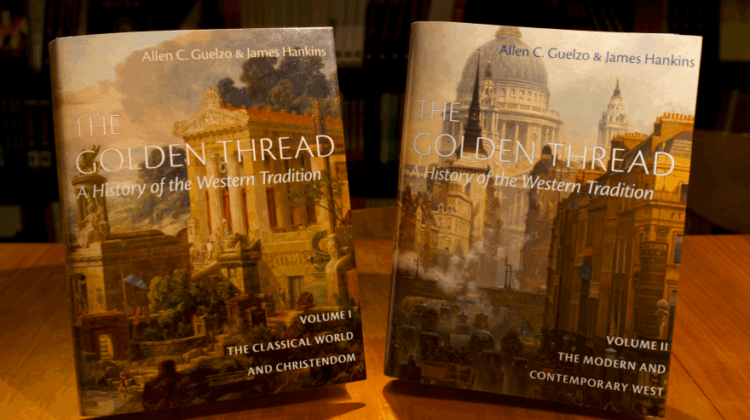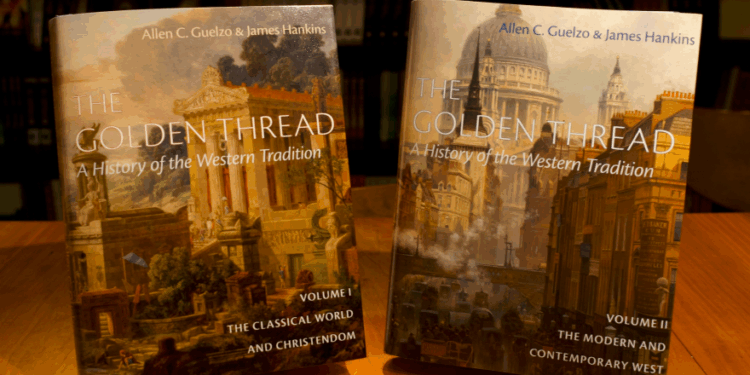
[Order Michael Finch’s new book, A Time to Stand: HERE. Prof. Jason Hill calls it “an aesthetic and political tour de force.”]
For more than half a century, one of the primary aims of cultural Marxists has been to infiltrate teaching and administrative positions in higher education and subvert the transmission of what poet Matthew Arnold called “the best which has been thought and said” – the grand legacy of Western achievement. That’s because passing that legacy down to the next generation undermines the Left’s inculcation of groupthink in that generation. It also contradicts the Left’s dogmatic insistence that Western civilization has been a uniquely oppressive, exploitative, and toxic force in world history, and therefore must be dismantled. (Remember in the early 1980s when Jesse Jackson led Stanford University students in a chant of “Hey ho, hey ho, Western Civ has got to go”?) The Left has been so successful at this mission that it is difficult to find a modern Western Civ textbook that does not reflect their subversive perspective.
Enter a magnificent new two-volume work titled The Golden Thread: A History of the Western Tradition. This textbook deliberately rejects anti-Western propaganda and reclaims a properly balanced view that does not whitewash the history of Western civilization, but fairly celebrates its triumphs and its role as an overall driver of human liberty and prosperity. I am loath even to call it a textbook, because that word suggests, for many, an academically dry litany of dates, charts, and royal lineages. The Golden Thread is definitely not that.
The two-volume series hails from Golden Thread Academic, a new educational imprint of Encounter Books “dedicated to restoring rigorous academic standards worthy of—and essential to—our national and civilizational traditions.” Only Vol. I: The Ancient World and Christendom, written by longtime Harvard history professor James Hankins, is available so far; Vol. II: The Modern and Contemporary West, by Hankins’ Princeton colleague Allen C. Guelzo, will be released in mid-December.
(I had author Hankins on my podcast The Right Take recently for a very compelling conversation. I urge you to check it out. I intend also to have his writing partner Prof. Guelzo on the show when his Vol. II is available.)
The Golden Thread: Vol. I: The Ancient World and Christendom truly is a masterful narrative of Western civilization’s intellectual, cultural, and moral foundations, as well as its enduring achievements and values. It distinguishes itself through an intellectually robust defense of the Western tradition, offering an unapologetically conservative perspective, a refreshing counterpoint to the prevailing progressive push to “de-center” Western civilization. In an academic landscape dominated by progressive critiques that emphasize the West’s flaws—its imperialism, inequalities, and supposed cultural appropriations—Hankins argues that the West’s contributions to human civilization are foundational to global progress. He emphasizes its role in fostering democracy, individual liberty, scientific inquiry, and artistic excellence.
This traditionalist perspective comes through even in what some might consider small details, such as using the terminology BC (before Christ) and AD (anno domini – in the year of the Lord) rather than what has been the norm in academia over the last several decades: the secular terminology BCE (before the common era) and CE (common era).
The book features breathtaking illustrations that capture the grandeur of Western art and architecture; meticulously curated photographs of ancient artifacts and sweeping vistas of historical sites; and detailed maps that enlighten rather than obfuscate. But the prose of The Golden Thread is as elegant as its visuals, blending scholarly rigor with accessible storytelling. Hankins writes with a clarity that makes complex historical developments comprehensible. His conservative perspective never feels dogmatic but rather organic to the evidence he presents. For example, his discussion of the Judeo-Christian pillar of Western morality is supported by careful analysis of historical texts and events, making his argument persuasive rather than polemical.
Hankins begins with the ancient Greeks, portraying them as the architects of rational thought and democratic ideals that continue to shape modern governance and ethics. His treatment of Rome is equally laudatory, highlighting its legal innovations, engineering marvels, and cultural synthesis as cornerstones of Western identity. Hankins underscores its role in creating a stable, interconnected world that laid the groundwork for medieval Christendom. The book’s time frame ends just before the Reformation in the early 16th century.
At over 1200 pages (not including notes, photo credits, and index), this is not a book that you sit down and read from cover to cover. It’s a volume to dive into deeply but in concentrated bursts – or to simply browse. And at $100 a volume (but heavily discounted on Amazon), The Golden Thread is not a casual purchase, but it is an invaluable investment in educating your children or grandchildren (or yourself, for that matter) about the highlights and lowlights, the glories and the travesties, the whole magnificent sweep of Western civilization, in a way that you won’t get in public schools or even most private schools. Why is this investment so crucial to present and future generations? As Prof. Hankins writes,
The dangers presented by the neglect of Western history are not trivial. When citizens of Western countries are utterly ignorant of history, as most now are, they are left unarmed against the general hostility to their own tradition that has become so destructive force in contemporary culture.
[…]
It should come as no surprise that the recent generations of westerners who believe that the West is uniquely evil have been taught nothing at all about it.
[…]
[W]e want our readers to understand just how fragile our tradition is and how many times in the three-thousand-year-long history of the West the golden thread that ties us to our past and enriches us beyond measure has come close to snapping.
To reiterate, The Golden Thread Vol. I: The Ancient World and Christendom is a triumph of historical scholarship and visual artistry. Besides being a joy to browse, its defense of Western values and achievements, while not uncritical, offers a refreshing and necessary countercultural alternative to the standard textbook fare. For anyone seeking a deeper understanding of the roots and evolution of the West, or simply a beautifully presented journey through our glorious culture, this book is essential to own. It stands as a testament to the enduring brilliance of a civilization that, despite its flaws, has woven a golden thread of progress through the tapestry of human history.
Follow Mark Tapson at Culture Warrior.

















